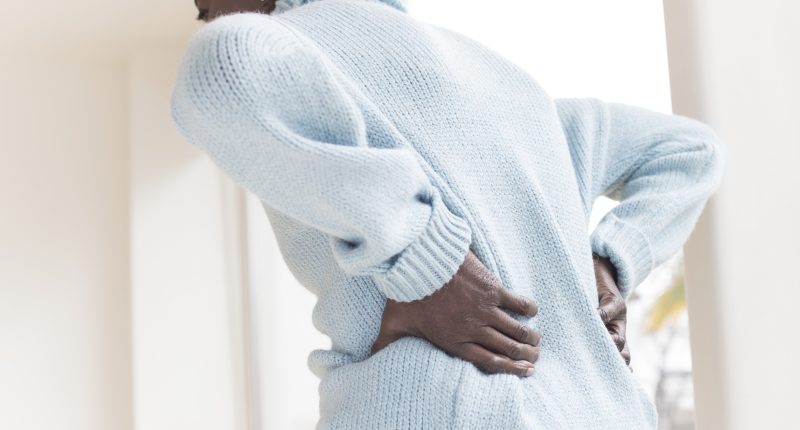THOUSANDS of people suffering with back pain could be eligible for benefit payments worth up to £173 a week.
Back pain is sadly all too common, but if yours is the result of a chronic or long-term health condition, you could get a cash boost.
This could be caused by various forms of arthritis, such as Osteoarthritis and rheumatoid arthritis.
Back pain may also come as a result of conditions like pneumonia and even sleep apnea.
If you have any of these conditions, you could be eligible to receive the personal independence payment (PIP) every week.
PIP is a benefit paid to people with long-term physical or mental health conditions of disabilities.
READ MORE IN MONEY
The payment can boost your income by thousands of pounds a year, and you can be eligible whether you are in work or not.
There are two elements to PIP: a daily living part if you need help with everyday tasks and a mobility part if you need help with getting around.
But in total the payments can be worth up to £172.75 a week, so if you don’t claim it already, check to see if you’re eligible.
The DWP says that while there is no specific list of conditions that entitle people to PIP, the impact it has on your daily life could mean you are eligible.
Most read in Money
What is PIP?
Millions suffering from long-term health conditions or disabilities get extra cash help through personal independence payments (PIP).
You can get PIP even if you’re working, have savings or are getting most other benefits.
The payments can be worth up to £172.75 a week, so if you don’t claim it already, check to see if you’re eligible.
PIP is available to those aged 16 or over but no fresh claims can be made if you’ve reached the State Pension age.
The current state pension age is 66 but this is set to rise to 68.
Crucially, you must also have a health condition or disability where you either have had difficulties with daily living or getting around (or both) for three months, and you expect these difficulties to continue for at least nine months (unless you’re terminally ill with less than 12 months to live).
Difficulties with daily living can include:
- Preparing or eating food
- Washing, bathing and using the toilet
- Dressing and undressing
- Reading and communicating
- Managing your medicines or treatments
- Making decisions about money
- Engaging with other people
You can claim PIP at the same time as other benefits, except the armed forces independence payment.
If you receive constant attendance allowance you will receive less of the daily living part of PIP.
If you get war pensioners‘ mobility supplement you will not get the mobility part of PIP.
What are the current PIP rates?
PIP is made up of two parts, and whether you get one or both of these depends on how severely your condition affects you.
How much you get also depends on how your condition affects you.
You may get the mobility part of PIP if you need help going out or moving around. The weekly rate for this is either £26.90 or £71.
Meanwhile, on the daily living part of PIP, the weekly rate is either £68.10 or £101.75 – and you could get both elements, so up to £172.75 in total.
Payments are usually made every four weeks directly into your bank account, and they’re tax-free.
Benefit payments are rising by 6.7% from April, in line with the consumer price index (CPI) level of inflation for September 2023.
It will mean those on the daily living part of PIP will see their payments rise to either £72.65 or £108.55 a week.
The payments for the mobility part of pip will rise to £28.70 or £75.75 a week at the same time in April.
We’ve previously revealed the exact amount that other benefits are rising in April – including Universal Credit and Pension Credit.
How do I apply for PIP?
You can make a new Personal Independence Payment (PIP) claim by calling the Department for Work and Pensions (DWP) on 0800 917 2222.
There are also other ways to claim if you find it difficult to use a telephone. See Gov.uk for more information.
When you claim, you’ll need the following information:
- Your contact details
- Date of birth
- National Insurance number
- Bank or building society account number and sort code
- Your doctor or health worker’s name
- Address and telephone number,
- Dates and addresses for any time you’ve spent abroad, in a care home or hospital
Someone else can call on your behalf, but you’ll need to be with them when they call.
You’ll then be sent a form to fill in, after which you’ll be invited for an assessment or your health or social care worker will be asked for information.
After this, you’ll be sent a letter telling you if your claim has been successful.
You can read Citizens Advice’s help on preparing for an assessment guide on its website.
READ MORE SUN STORIES
If you apply for PIP and are unsuccessful you can appeal a decision.
Do you have a money problem that needs sorting? Get in touch by emailing [email protected].
Plus, you can join our Sun Money Chats and Tips Facebook group to share your tips and stories.









